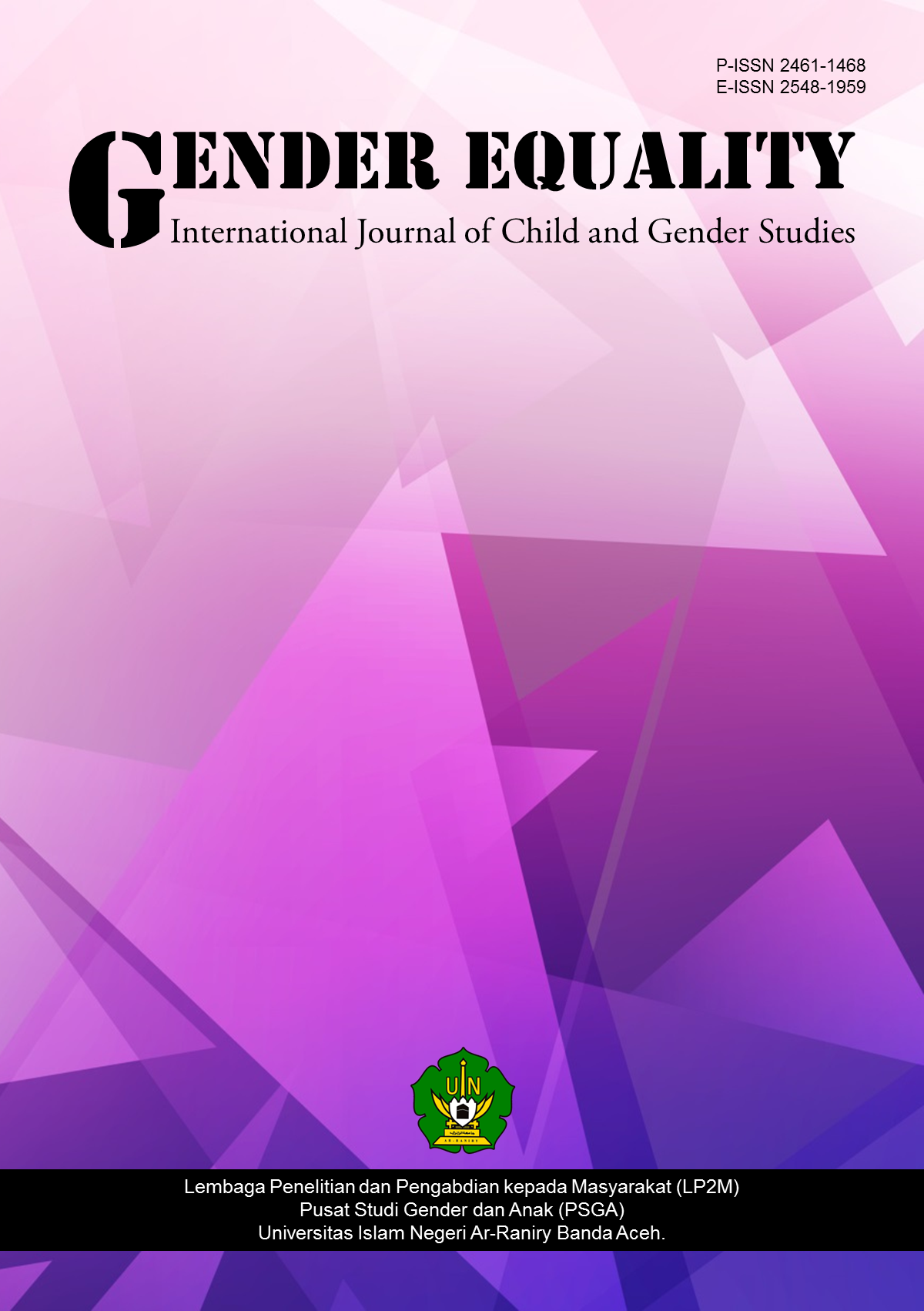Kecerdasan Emosional Siswa Sekolah Dasar Negeri (SDN) dengan Siswa Sekolah Dasar Islam Terpadu (SDIT) di Kota Banda Aceh
DOI:
https://doi.org/10.22373/equality.v3i1.1946Keywords:
Kecerdasan Emosional, Sekolah Dasar & Sekolah IslamAbstract
Emotional intelligence is an ability for someone to control and recognise their own emotions and others’s. Emotional intelligence can be developed through education and school environment. The purpose this study is to know the difference of emotional intelligence between Public Elementary School and Islamic Private Elementary School in Banda Aceh. The quantitative method is used with purposive sampling technique, involving 256 students of fifth grade, within the range of age 10 to 11 years old, both girls and boys. The Study took place in two Public Elementary School and two Islamic Private Elementary School in Banda Aceh. The data was analyzed by using t-test independent samples, the result shows t-count 0,745 < t table 1,969 and p 0,457, that is means there is no difference of emotional intelligence between Public Elementary School and Islamic Private Elementary School in Banda Aceh.References
Agustian, A. G. (2007). Rahasia Sukses Membangun Kecerdasan Emosi dan Spiritual ESQ: Emotional Spiritual Quotient Berdasarkan 6 Rukun Iman dan 5 Rukun Islam. Jakarta: ARGA Publishing. Akbar, M., Shah, A. A., Khan, E. A., Akhter, M., & Riaz, M. N. (2011). Relationship between emotional intelligence and academic achievement among higher secondary school students. Pakistan Journal of Psychology, 42 (2), 43-56. Alegre, A. (2005). The Effects of Parenting Practices in the Development of Children’s Emotional Intelligence. Child Development, 65, 457-477. Asmaya, E. (2010). Prinsip Melatih Kecerdasan Emosi Anak. Jurnal Dakwah dan Komunikasi, 4 (2), 314-328. ISSN: 1978-1261. Atmoko, A. (2012). Psikologi Terapan. Dalam Prawitasari, J. E (Ed.), Hubungan Manusiawi Guru dan Murid (h. 50-72). Jakarta: Erlangga. Bachtiar, S. (2012). Buku Pintar Memahami Psikologi Anak Didik. Yogyakarta: Pinang Merah Publisher.
Bar-On, R. (2007). Educating People to Be Emotionally Intelligent. Chapter 1: How Important Is It to Educate People to Be Emotionally Intelligent, and Can It Be Done?. America: Preager Publishers. Diunduh dari http://dl.bookos.org/genesis/604000/84783ce16fe1d62a82b9fbffb2936ec9/_as/%5BReuven_Bar-On,_Maurice_Jesse_Elias,_J.G._Maree%5D_E(Bookos.org).pdf.
Caruso, D.R., Salovey, P. (2004). The Emotionally Intelligent Manager: How to Develop and Use the Four Key Emotional Skills of Leadership. America: HB Printing. Diunduh pada tanggal 5 April dari http://dlx.bookos.org/genesis/54000/2755a6cfbc57a082d655596d5d0d95b9/_as/%5BDavid_R._Caruso,_Peter_Salovey%5D_The_Emotionally_I(Bookos.org).pdf. Efrida, S. R. (2009). Persepsi cara mengajar guru dengan motivasi belajar siswa SMP Katolik Yohanes Gabriel Blitar. Abstrak. Universitas Wisnuwardhana. Diunduh pada tanggal 29 April 2013 dari http://fpsikologi.wisnuwardhana.ac.id/index.php?option=com_content&view=article&id=15:persepsi-cara-mengajar-guru-dengan-motivasi-belajar-siswa-smp-katolik-yohanes-gabriel-blitar-&catid=2:artikel&Itemid=11. Goleman, D. (2000a). Kecerdasan Emosi: Mengapa EI Lebih Penting Dari Pada IQ? (Terjemahan). Jakarta: Gramedia Pustaka Utama. Goleman, D. (2000b). Working With Emotional Intelligence (Terjemahan). Jakarta : PT. Gramedia Pustaka Utama.
Hernowo, T. B. (2010). Perbedaan kecerdasan emosional (EQ) antara siswa sekolah formal dengan homeschooler. Papers. Universitas Gunadarma. Diunduh pada tanggal 30 April 2013 dari http://papers.gunadarma.ac.id/files/journals/5/articles/957/public/957-2536-1-PB.pdf.
| Ge nder Equality: International Journal of Child and Gender Studies
Kecerdasan Emosional Siswa Sekolah Dasar Negeri (SDN) dengan Siswa Sekolah Dasar Islam Terpadu (SDIT) di Kota
Banda Aceh
Hogan, M. J. (2009). The importance of emotional intelligence and social support for the academic success of adolescent with and without learning disabilities. Department of Human Development and Applied Psychology. Diunduh pada tanggal 28 April 2013 dari http://e-resources.pnri.go.id:2058/docview/305110635/previewPDF?accountid=25704.
Jaringan Sekolah Islam Terpadu (JSIT) Indonesia. (2012). Anggaran Dasar. Diakses pada tanggal 15 Oktober 2012 dari http://jsit.web.id/r1/profil/anggaran-dasar/. Kementerian Pendidikan dan Kebudayaan (Kemdikbud). (2012). Visi dan Misi Kementerian Pendidikan dan Kebudayaan. Diunduh dari http://www.kemdiknas.go.id/kemdikbud/tentang-kemdikbud-visi.
Koesoema, D. (2007). Pendidikan Karakter: Strategi Mendidik Anak di Zaman Global. Jakarta: Grasindo.
Kremenitzer, J. P. (2005). The Emotionally Intelligent Early hildhood Educator: Self-Reflective Journaling. Early Childhood Education Journal, 33 (1). DOI: 10.1007/s10643-005-0014-6.
McPheat, S. (2010). Emotional Intelligence. MTD Training & Ventus Publishing ApS. Diunduh pada tanggal 25 Maret dari http://dlx.bookos.org/genesis/445000/f902a8a2bf0b66cde2f1f67db33cd673/_as/%5BSean_McPheat%5D_Emotional_Intelligence(Bookos.org).pdf. Preeti, B. (2013). Role of Emotional Intelligence for Academic Achievement for Students. Research Journal of Educational Sciences, 1 (2), 8-12. Purwandari, E, & Purwati. (2008). Character building: pengaruh pendidikan nilai terhadap kecerdasan emosi anak. Jurnal Penelitian Humaniora, 9, 13-31. Rosemary, A. (2008). Perbedaan kecerdasan emosional antara siswa Sekolah Menengah Atas (SMA) dengan siswa Madrasah Aliyah (MA) di pondok pesantren. Skripsi. Universitas Indonesia. Santrock, J. W. (2007). Perkembangan Anak. (Ed. 11). Jakarta: Erlangga. Santrock, J. W. (2002). Life-Span Development: Perkembangan Masa Hidup (Ed. 5). Jakarta: Erlangga. Sarong, A. H. (2003). Kontekstualisasi Syariat Islam di Nanggroe Aceh Darussalam. Banda Aceh, Darussalam: Ar-Raniry Press. Sufi, R., Wibowo, A. B. (2004). Budaya Masyarakat Aceh. Badan Perpustakaan Provinsi Nanggroe Aceh Darussalam. Suharsono. (2005). Melejitkan IQ, IE dan IS. Depok: Inisiasi Press. Yusuf, S. (2005). Psikologi Perkembangan Anak dan Remaja. Bandung: PT Remaja Rosdakarya. Zeidner, M., Matthews, G., & Roberts, R. D. (2009). What We Know About Emotional Intelligence: How It Affect Learning, Work, Relationships, and Our Mental Health. Cambridge: The MIT Press. Diunduh pada tanggal 28 April 2013 dari http://dl.bookos.org/genesis/475000/d4457dd6d3016ad05535f97654ff5070/_as/%5BMoshe_Zeidner,_Gerald_Matthews,_Richard_D._Robert(Bookos.org).pdf.
Downloads
Published
Issue
Section
License
GENDER EQUALITY: International Journal of Child and Gender Studies allows the author(s) to hold the copyright and to retain the publishing rights without restrictions. Authors who publish with this journal agree to the following terms:
- Authors retain copyright and grant the journal right of first publication with the work simultaneously licensed under a Creative Commons Attribution License that allows others to share the work with an acknowledgment of the work's authorship and initial publication in this journal.
- Authors are able to enter into separate, additional contractual arrangements for the non-exclusive distribution of the journal's published version of the work (e.g., post it to an institutional repository or publish it in a book), with an acknowledgment of its initial publication in this journal.
- Authors are permitted and encouraged to post their work online (e.g., in institutional repositories or on their website) prior to and during the submission process, as it can lead to productive exchanges, as well as earlier and greater citation of published work.



